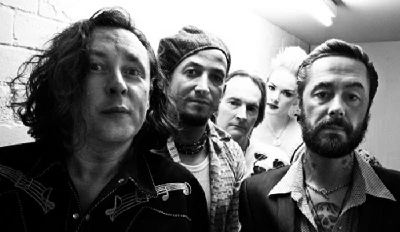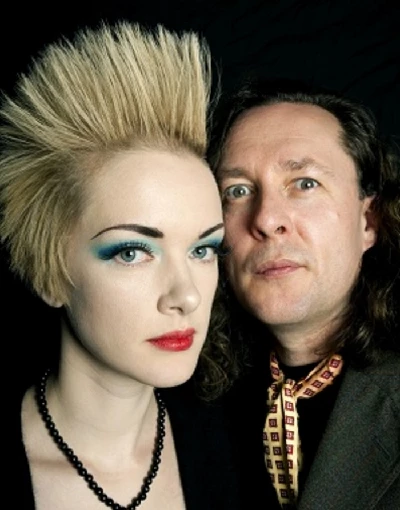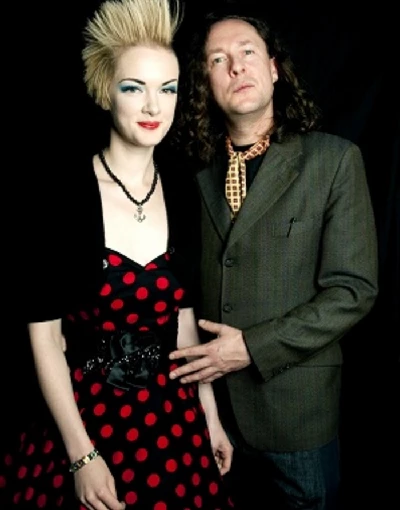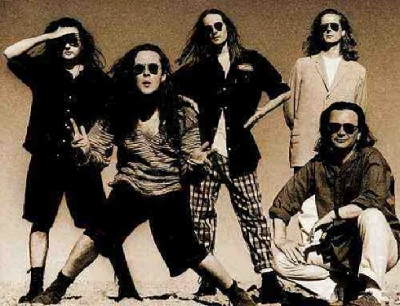Wonder Stuff
-
Interview with Miles Hunt
published: 24 /
7 /
2012

Paul Waller speaks to Miles Hunt, the front man with bestselling 90's act the Wonder Stuff, about their current 'From the Midlands with Love’ cover singles project; forthcoming first album in eight years, and the break-up of the first line-up of the band at the height of their fame
Article
The Wonder Stuff first came in to this Pennyblackmusic scribe’s life back in 1991, a few months before their classic 'Never Loved Elvis' album was released. The band’s first two LPs, 1988’s ‘The Eight Legged Groove Machine' and 1989’s ‘Hup’ , I had bought on the recommendation of a friend, and they had provided me with some of my all-time favourite songs, but nothing prepared me for what was to come. 'Never Loved Elvis' took the song writing to the next level. Every track on the album was as good, if not better, than the last.
When I found out they were playing Brixton Academy that Christmas I just had to get myself a ticket. It was my first gig in the big smoke and was enough to confirm that this band was the band for me. Like any young obsessed fan does, I bought anything and everything to do with the band that I could afford. My walls were papered with huge posters of Miles Hunt's curly mug, and with every front cover of ‘NME’ and ‘Melody Maker’ on which they appeared.
Fast forward 21 years later and I get a call from PBM HQ. Miles Hunt will be on the phone in 24 hours! Out came that fan boy once more as I dialled the number . . . .
PB: After watching the video for your recent Slade cover and ‘Far Far Away ‘single, it occurred to me that the band was having fun again and you are functioning together now as a proper unit. Instead of releasing albums with huge gaps in between can fans like me can expect singles and albums with hopefully a little more regularity?
MH: Definitely, I think there is one major point to bring up that has been the influence to this in that last October, the original guitarist Malc (Treece-Ed) quit and he was the last original member. Since ‘Suspended by Stars’, the last record we made together which was seven years ago, I had been badgering him for ideas - “Just give me some riffs and let’s put some things on tape,” and, as I say it’s been the same for years, just getting nothing and finding it incredibly frustrating. I was letting that stopping me from getting on with it.
Once Malc was gone I said to myself, “Of course I can do it, can’t I?” So I have been writing feverously and been thinking “Well, what is the band now?” I’ve had a real load of positive support from mates and I can do what I want with it now really. It’s a totally new band under the new moniker so really since he’s gone and the touring finished last year I felt I didn’t have to worry about replacing the guitarist just yet and was thinking about our next move. So we came up with the ‘From the Midlands with Love’ idea (A series of double A-side 7” inch vinyl singles, featuring cover versions of a few of the band’s favourite Midlands-produced music-Ed), and cracked on with that.
With the first single I just did all the guitars and our sound engineer, Stevie Wyatt, who had been with us for seven years said to me via an email, “I’m only going to say this once but I can see Malc is parting and I would love to write with you so why don’t you take me up on it?” I was surprised as I didn’t even know the bloke played guitar so we had a little session about four months ago around our house and he was fantastic and he had all these ideas that we quickly recorded and suddenly this shadow that had hung over the band, this unwillingness to work and create was completely gone and replaced by the complete opposite. Of course I had to discuss it with Erica (Nockalls, violin-Ed) and Mark (McCarthy, bass-Ed) as they had been with this line up the longest just to see if they thought we could still get away with calling us the Wonder Stuff, and they were both really supportive and wanted to crack on.
For us it’s just now complete positivity all the time. I mean - holy shit!- I’ve gone through so many line up problems with this band over the past 25 years (Laughs), and now finally have a team that wants to fucking do something, so, yeah, it’s a great place to be at the minute.
PB: From the perspective of the fan we are happy getting the releases that we get but the gaps between them are becoming ridiculous. It’s like waiting for Kate Bush to release music. I know you haven’t rested on your laurels and have released solo stuff. but I now feel there is some spirit of a real band to follow again.
MH: (Laughs) Yeah, definitely, since ‘Suspended by Stars’ which was the last one we did back in 2005 we’ve done two albums with me and Erica plus a live album. There have been the albums I’ve produced as well including the Dirty Ray album, so every year I’ve been working on an something but hitting on the Midlands thing it’s actually been a lesson in song writing as well which has helped now I am sitting down to write an original album which I have fifteen tracks ready for, although it’ll probably be trimmed down to eleven or something.
Working out covers such as ‘Blackberry Way’ where the chorus comes in maybe a minute in the song and songs don’t have to be five and a half minutes. If you can get it down to three all’s the better. So actually deconstructing people’s work and putting it back together in a way where we would play it has been a lesson without causing tension. You know, just let’s have some fun and record some tunes.
PB: What about your Dexy’s cover, ‘There, There My Dear’. That must have been tricky to find your way into that song?
MH: That’s a killer. I think amongst the band that was everybody’s favourite that we have done in the ‘From the Midlands with Love’ series, but we have only done four so far.
PB: How many more cover versions can we expect?
MH: Well, there is going to be one more single so that makes six in total with the full band and the idea is to have ten in total, but I wanted the six that we have used on the singles to have been hits so people would go “Oh yeah, fucking hell, I know that,” and with the other four we could do that to make it an album’s worth and for those extra four I was thinking stuff like the Swell Maps’ Nikki Sudden. He did stuff I loved that wasn’t a hit so I’m looking for extra hats by Midlands artists that I grew up with and loved.
PB: Who is picking these tracks. Is it just yourself?
MH: It is really. It comes down to me but there is constant conversation between everyone. Fuzz Townshend on drums is the only other member than me that comes from Birmingham, and he came up with some great ones. We were looking at ‘Rudi’s in Love’ by the Locomotive, which was Bob Lamb’s band from 1968 which was kind of a ska track but it was such a great song that you could take the ska out of it. But somebody said that the Ordinary Boys already covered that but then we were looking at Steel Pulse and UB40 songs. Again obviously Birmingham had a richness of reggae bands when I was a teenager so we looked at taking the reggae out of them and using the choruses and the chord changes because I think the Wonder Stuff doing reggae would be absurd, but, yeah, the choice all came down to me.
Funnily enough we did some research and found some beautiful tracks by the Moody Blues that I had never heard of so it was like, yes, this is on the list but now of course the list is pretty long. So for now for the next month I will be finishing off the tracks for the new album, and then after that we will go through the list and get those covers done.
PB: As a music fan growing up it was yourself and a few others that were my heroes. I did the usual teen things like hanging massive posters on my wall and annoying my parents with music blaring out the same songs like ‘Caught in My Shadow’ on repeat on their day of release. Did you ever get obsessed with artists like that when you were younger?
MH: Oh God, yeah. I loved the Tom Robinson Band, I was a huge fan.
PB: I only know the ‘War Baby’ single from 1983. But I love that.
MH: Yeah, that was his solo stuff though. The actual Tom Robinson Band were the one. The ‘Power in the Darkness’ album from 1978 was incredible, and the drumming, wow, Dolphin Taylor was fantastic, and Danny Kustow is still up there with, well, let’s just say I am not a fan of lead guitar parts in my own music but I love it in his. His solos on the first two TRB albums are just incredible.
Also the Clash and the Banshees, all this punk and new wave all the way for me. That all happened when I was eleven or twelve and they were my first posters on my wall. That stuff to this day stays with me. I was listening to Andrew Collins on the radio doing the breakfast show yesterday morning, and he played ‘Christine’ by the Banshees and that was so exciting to hear. It was such an unusual track but. you know it was a Top Twenty hit! Where the hell did they get that from? That drumbeat is weird and the lyrics are mental.
So that would come out one week and the Ruts were the next, I mean, fucking hell, what a great time to be a singles buyer. That was the time when you had to sell a lot of records to get into the Top Twenty and I just don’t here it these days. I don’t hear unusual. I hear rubbish and obvious influences.
PB: I don’t think that is because of your age either. I see it as a truism. Chart music has become safe and predictable.
MH: Yeah, everything, I hear by new artists I have heard it before. I tend to think, “I know exactly where you got that from.”
PB: Being only a few years younger than yourself I found the same thing. Popular artists would always be at least a little experimental. A band like the Cure freaked my parents out. I remember when ‘Love Cats’ came out it was so distinctly odd.
MH: Yeah, they were a band that created a really moody album like ‘Seventeen Seconds’, and within a couple of years they did ‘Love Cats’, ‘Caterpillar’ and ‘Why Can’t I Be You?. They would do these really brilliant singles, and then they would do these really mad albums like ‘Head on the Door’ and then went really dark with ‘Disintegration’.
PB: What a career, eh?
MH: Yeah, well. you know in the mainstream the Wonder Stuff had had a career where we have been seen as a bit daft ,and we asked asked for it by making silly videos and doing a record with Vic Reeves (‘Dizzy’, 1991-Ed), but my idea for us was looking back to bands like Slade. They knew how to write hit singles but their albums would be fucking great rock records, and even someone like the Sweet would write these absurd glam hit singles but to me when I hear old album tracks of theirs or see footage of them playing live they are like Iron Maiden.
How records labels used to be, similar to when we signed to Polydor who I still have no complaints about to this day is that they let us be who the fuck we wanted to be. From what I hear these days singles seem to support the career of the band ,and on the album they just don’t seem to have a lot more.
PB: When I first saw my first Wonder Stuff show at the Brixton Academy, with Kingmaker and Eat also on the bill, it felt to me and my friends at least that you were on the cusp of something new. You weren't just some indie band. It felt like you were really going to break through as this was before you were Top 5 or anything. Did you guys feel that too?
MH: Well, it was a really busy time and there wasn't a great deal of time to think. We were constantly being sent somewhere to do something, usually against our will. Also, I think the band was cursed by the fact that, even then, we didn't really like each other; the rot had really set in by the third album. I wrote most of ‘Never Loved Elvis’. Fiddley (Martin Bell, violin and banjo-Ed) wrote the music to 'Cheap Seats', but everything else I wrote without help from anyone.
We were in our mid-20s. We'd met in our late teens and, you know, people’s lives develop and change. Priorities change and just trying to get people in the studio to just jam and just gets some ideas was fucking impossible.
PB: Well, obviously life happens, but you would think with the circumstances at that time, that you had earned this success, that people could, not put things on the back burner, but make it all co-exist?
MH: For me it was a constant struggle to try and engage them at that point. I don't know whether there was any resentment because our PR was saying, "Miles has got to go to Europe for two weeks to do promotion with the band manager," and they were just left at home, but I was just doing what the PR was suggesting and maybe that fuelled some resentment.
It didn't feel like it at the time, but everyone had different things going on in their lives. But I remember being at Brixton and doing five nights in a row, and I remember being back stage and being fucking miserable. I would spend all my time in the support band’s dressing rooms. We just didn't like being with each other.
PB: Wow, I didn't realise that it was at that point that the rift had started; I thought it was much later on. A year later in 1992 I saw you at Reading Festival, playing alongside bands like Public Enemy and Nirvana. Obviously things were pretty rotten in the band by then, and with the grunge movement growing so quickly, did you feel like the Wonder Stuff were getting left behind?
MH: Not really, no. It was a great moment, that weekend. We got paid something ridiculous to do Reading, like £200,000. At one point you had our manager, who was from LA, talking to some other American guy, and this guy was saying "Dude, how the fuck did you get 200 grand for the Wonder Stuff for this show? I've never heard of them?" And then I walked in to the conversation and our manager said, "John, this is Miles from the Wonder Stuff," and this John guy apologised and I said to him, "I heard that. Why are you annoyed by what we're getting paid?" and he said, "I'm Nirvana’s manager and they're the biggest fucking band in the world and they only got 150 grand!" and I thought, “Brilliant. We got paid more than Nirvana!”
I just didn't understand I suppose how big and important Nirvana was going to become over the next few years. To be honest I didn't really like them. I thought they sounded like a shit version of Stiff Little Fingers. I just thought grunge was so simple, so retro, surely it can't mean anything. How wrong was I!
PB: Well, yeah! The last time I saw you before the split was at Phoenix Festival, the final show. I was so pissed off with the press. All they were talking about was how you'd cut your hair. Even the audience, they were saying the same thing and I just felt like I was witnessing the demise of one of the great indie bands. I just thought no wonder you wanted to pack it in at that point.
MH: (Laughs). The funny thing is, with the benefit of hindsight I can see that splitting up at that point was an error. At the time I just wanted to get away from making music and I certainly wanted to get away from those people. That was the drive really.
When it was announced that we were splitting I was called in to Polydor Records on my own to see the head of the label at the time, and he said, "What the fuck are you doing?" and I told him I'd just had enough. I got on well with everyone at Polydor and they offered me the opportunity, just me, not the rest of the band, to have a year off with pay, put my feet up, not write songs, not be in the Wonder Stuff, and then regroup in a year’s time, with or without the same line up. And I said no. Because during that year I would just be thinking,"I've got to go back to this".
With the benefit of hindsight I should have taken his offer really, because within a year and a half, making music was what I wanted to be doing, and I did it with my next band Vent 414 and I thoroughly enjoyed everything we did. We had a good time. And now the Wonder Stuff are back together and writing, so maybe the regret is all irrelevant.
PB: In ‘Melody Maker ‘once, you did say that you don't do it for the money. You're not in it for the money, and that's not the motivation for your music.
MH: Yeah well, look at someone like Damon Albarn. He doesn't need any more money and he's still working. He's got Blur. He's got other projects on the go at the same time and all power to him. Having a few million quid in the bank doesn't make you want to stop making music and creating.
PB: To speed forward a little bit, Erica is an integral part of the music you make now. How did you guys initially meet?
MH: Well, we’d done ‘Escape From Rubbish Island’, which was released in 2004, with no violins and we toured just as a four piece. Then we were writing. and I thought I'd like to hear some violin on the next record. So I said this to our producer at the time, Matt Terry, and he said he'd seen this girl busking, and she's in a progressive metal band in Birmingham, and should he get her phone number and see if she's interested. So she came down to see us play as a 4 piece and a couple of weeks later we had a little knock around with some of the old songs, like ‘Tricks of the Trade’ and ‘Angelica Maybe,’ and she fitted in fantastically and it's just been all good.
PB: I saw you at Tunbridge Wells Forum in July 2010, after having not seen you since way back, and it was just seamless and it made me dig out all the records I'd missed in between. So when I got home I watched an interview on line and you mentioned that you're doing an autobiography. How's that going?
PB: Well, it's completely come to a standstill this year; I started it years ago, just writing rough drafts of stuff from old diaries which I've got on various old computers and aptops. Then a few years ago I thought I'm going to get it all out and transcribe it all, and I'm going to start taking it seriously. I don't really want to write a biography as such, but what I'd like to do eventually is set the beginning of the book in the present and talk about life now, and then reminisce.
I don’t know if you've read any of Simon Gray’s books? Basically he's in his 70s I think, and dying of cancer, and he starts his books with him in his life now, making a cup of coffee and having a fag, and then starts reminiscing about old friends and his life, and that's sort of what I'd like to do.
I like telling stories and there's plenty from 25 years of being in a band, and plenty from school and that as well. So it's not like a definitive biography, but more of a series really. I've just got to get some stuff on paper! Ideally, we'll get this Wonder Stuff record out, get some touring done next year and then I’ll sit down for say, six months, and get everything out and formulate it into the first of the series of books.
PB: Thank you.
Band Links:-
http://www.thewonderstuff.co.uk/
https://www.facebook.com/thewonderstuf
https://twitter.com/thewonder_stuff
https://www.youtube.com/user/TheWonder
https://www.instagram.com/thewonderstu
Picture Gallery:-


